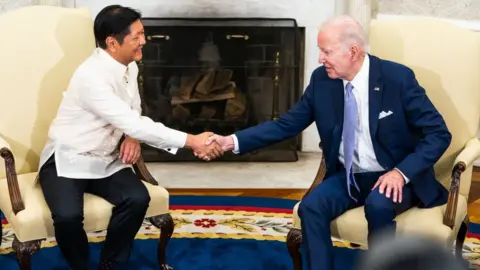During a visit to Manila on Tuesday, US Secretary of State Antony Blinken reaffirmed America’s steadfast support for the Philippines, a significant ally of Washington, amidst escalating tensions with China. Blinken emphasized the United States’ unwavering security commitments to the Philippines, highlighting the crucial importance of the South China Sea to the nation’s security and economy. He underscored that these maritime routes are not only vital to the Philippines but also hold strategic significance for the broader region, the United States, and the global community. Blinken made these remarks during a press conference held jointly with Philippine Foreign Secretary Enrique Manalo.
“We stand with the Philippines and uphold our unwavering defense commitments, including those outlined in the mutual defense treaty,” stated Mr. Blinken, emphasizing America’s steadfast support during his discussions in Manila.
Additionally, a senior State Department official disclosed that Mr. Blinken would engage in talks regarding trade with Filipino officials.
Moreover, the visit is perceived as solidifying American backing for Philippine President Ferdinand Marcos Jr., who has leaned towards Washington, in contrast to his predecessor Rodrigo Duterte, who fostered closer ties with Beijing.
In another development, the White House revealed plans for President Joe Biden to convene a summit with Mr. Marcos and Japanese Prime Minister Fumio Kishida in April.
As Mr. Blinken’s aircraft descended over Manila, the gleaming lights of the city’s burgeoning skyscrapers shimmered across the bay. Despite becoming Southeast Asia’s fastest-growing economy last year, the Philippines continues to grapple with entrenched inequality and longstanding allegations of government cronyism, which have contributed to its tumultuous political landscape.
The Philippines retains its significance as a vital strategic outpost for the US, particularly due to its location in a region undergoing transformation, where China has emerged as a formidable challenger to American authority and sway.
Manila Bay serves as a gateway to the South China Sea, where the Philippines finds itself entangled in territorial disputes with Beijing, concerning territory, trade routes, and maritime boundaries, among other issues.
Although these disputes are longstanding, recent months have witnessed a surge in tense encounters between the Philippine and Chinese Coast Guard, heightening concerns of potential conflict. Incidents such as reported collisions between vessels of both nations and the use of water cannons by the Chinese against Philippine vessels have escalated tensions.
“The primary concern remains China’s ongoing destabilizing actions in the South China Sea, which violate international law,” remarked the senior State Department official. The Secretary of State is poised to underscore the paramountcy of freedom of navigation in the South China Sea during discussions.
The United States perceives China’s maritime maneuvers as a form of intimidation aimed at neighboring nations. With a well-established defense treaty with the Philippines, Washington has explicitly stated that any hostile action against Philippine vessels would trigger US mutual defense obligations.
Moreover, in 2014, the US and Manila inked a defense pact permitting American support for the development of Philippine military facilities and the rotational deployment of US troops. Expanding upon this agreement, in 2023, the US finalized access to four additional bases in a pivotal deal, symbolizing the deepening rapport between the two nations.

China has condemned the agreements, particularly due to the proximity of some bases to self-governing Taiwan, which Beijing regards as a separatist region but which the US has committed to defending militarily. Additionally, Beijing asserts historical rights over much of the South China Sea and alleges that the Philippines has disregarded suggestions to “manage” the territorial dispute.
Mr. Blinken’s visit will also be perceived in the Philippines as further validation of Mr. Marcos, the son of the ousted dictator Ferdinand Marcos, who was a staunch American ally during his two-decade rule until the mid-1980s. His tenure is marked by years of martial law, the arrest and torture of dissidents, and widespread corruption that led to an estimated $10 billion loss for the state.
However, the younger Marcos, elected in 2022 after a campaign that downplayed his family’s controversial past, has emerged as a crucial partner for Washington. His invitation to the White House last year during a four-day visit was widely interpreted as a reward for his alignment with Washington.



























